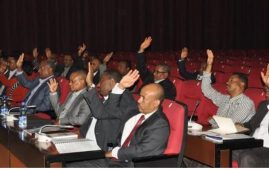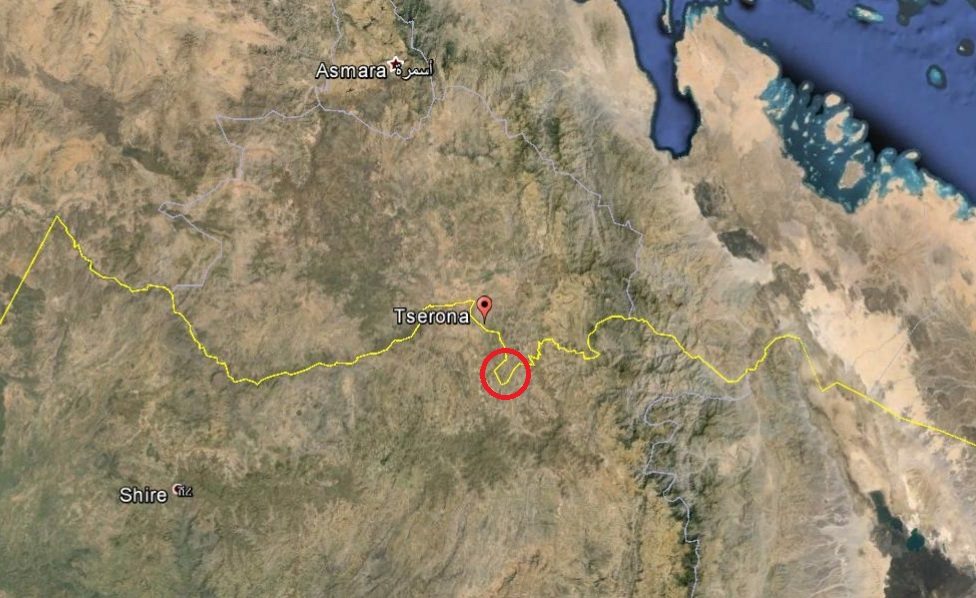A United Nation’s report indicates the Eritrean regime committed “systematic, widespread and gross human rights violations [that] may constitute crimes against humanity”.
The damning report, released today, came from the UN Commission of Inquiry on Human Rights in Eritrea that was established last year.
The Asmaran regime’s conducts is said, by the report, to be engaged in “a systematic violation of an array of human rights on a scope and scale seldom witnessed elsewhere in the world”.
Interests of national security or the prevention of crime cannot be excuses for the nature and scale of infringement of citizens’ rights, the UN Commission reiteratively stated.
The 484 pages report, which we are still reviewing, documented numerous rights violations.
Here under we presented ten takeaways to keep you updated – until we present details of the report:
1/ Thought-control
* “[Due to the] extensive spying and surveillance system targeting individuals within the country and in the diaspora,….Eritreans live in constant fear that their conduct is or may be monitored by security agents, and that information gathered may be used against them leading to arbitrary arrest, detention, torture, disappearance or death.”
* “It is impossible for an individual to know what activities may be considered “deviant” and sanctionable at a specific moment in time and what the consequences for such activities might then be.
* “The existence of such a pervasive control system generates a general climate of fear and mistrust in communities and even within families. In the words of one witness, “When I am in Eritrea, I feel that I cannot even think because I am afraid that people can read my thoughts and I am scared”.“
2/ Rehabilitation tax and Regret forms
* “The Government strives to control strictly any human movement…. To do so, it has established an intricate system of travel permits and identity cards, which must be produced during identity checks to verify an individual’s status with regard to compulsory national service and that person’s authorization to travel.”
* “Eritreans abroad can obtain a passport only upon payment of a mandatory “rehabilitation tax” amounting to 2 per cent of their earnings, a disproportionate price for a travel document. Those who left unlawfully also have to sign a regret form.”
3/ Religion treated as a threat
* “The Government perceives religion as a threat to its existence and has set about controlling it and its expressions. Only four religious denominations are authorized in Eritrea: Eritrean Orthodox, Catholicism, the Lutheran church and Sunni Islam.”
* “The religious gatherings of non-authorized denominations are prohibited. Religious materials are confiscated. Adherents are arbitrarily arrested, ill-treated or subjected to torture during their detention, and prisoners are coerced to recant their faith. Many religious followers have been killed or have disappeared.”
* “Jehovah’s Witnesses have been arbitrarily deprived of their citizenship. Apart from making it impossible for them to participate in public affairs, the loss of citizenship entails curtailment of the enjoyment of other fundamental rights, including the right to work”.
4/ Accused persons not aware of their trial and sentence
* “With no parliament meeting and the court system controlled by the executive, it could even be affirmed that there is no rule of law in Eritrea. Information gathered through the pervasive control system is used in absolute arbitrariness to keep the population in a state of permanent anxiety. It is not law that rules Eritreans, but fear.“
* “Investigators, security officers and military leaders also act as de facto magistrates; however, given that their decisions are not public, there is scarce information about them.”
* “Judgements are rarely made public or even communicated to accused persons, who are not always aware they have been tried and have no knowledge of how long they will be imprisoned.”
* “Some judges are conscripts whose “careers” depend on the Ministry of Defence at a salary of less than $2 a day, a clear violation of the principle of judicial independence and of their security of tenure.”
5/ No one knows the law that might have been broken
* “Arrests are often unjust, unpredictable, unreasonable and disproportionate. In most cases, people are arrested and detained for reasons that are arbitrary to such an extent that no one can possibly identify the law that might have been broken. Since formal charges are not laid, individuals are left to guess the reason for their arrest and detention, based on the line of interrogation or their conduct before arrest.”
* “Arrests and detention are ordered and conducted by any person with de facto authority, including local administrators, in breach of requirements that officials authorized to make arrests should be clearly identified.”
*“the lawfulness of the deprivation of liberty is not reviewed and detainees are released at the whim of the arresting or detaining officer. Detention in Eritrea cannot possibly be referred to as pretrial, given that individuals are rarely tried.”
6/ Countless victims of enforced disappearance
* “Since 1991, scores of people have been subjected to enforced disappearance, for known and unknown reasons…….When relatives enquire after detainees, they are informed by prison authorities that they have no information on the person arrested and warn them to cease their enquires or risk facing a similar fate.”
* “In the light of the anxiety and suffering that enforced disappearances cause families for extended periods, the commission finds that the right of family members not to be subject to torture, cruel, inhuman or degrading treatment is also violated.”
7/ “Shoot-to-kill policy” and mass killings
* “Since independence, extrajudicial executions and arbitrary killings have been widely perpetrated. Before 1998, punishment in the form of summary executions or extrajudicial killings was meted out against war veterans with disabilities and political opponents, and particularly targeted Muslims scholars.”
* “Eritrean soldiers accused of cowardice or desertions during the 1998-2000 war with Ethiopia were systematically executed. This also includes Eritreans and Ethiopians suspected of being “collaborators of the enemy” after the war, in particular Kunamas accused of having supported the Government of Ethiopia…….”
* “Mass killings have also been perpetrated against ethnic groups.”
* “Eritreans who attempt to leave the country are seen as traitors. For a considerable period of time, the Government has implemented a shoot-to-kill policy in border areas to prevent people from fleeing…Since people were still being shot at while trying to cross the border as late as 2014, the commission is not in a position to conclude that the policy has been officially abolished.
8/ Detainees forced to sleep in human waste
* “Conditions of detention are extremely harsh. When not held in solitary confinement or being used for labour (both common practices), inmates are locked night and day in extremely overcrowded cells characterized by unspeakable hygienic conditions. Proper toilets are not available in cells, and detainees are sometimes forced to sleep in human waste overflowing from the insufficient containers provided for this purpose. Access to fresh air and natural light is limited to bare minimum, often on purpose.”
* “Women are generally kept separated from men, but are rarely under the responsibility or attention of women officers. The lack of female officers responsible for and attending to female detainees puts them at increased risk of sexual and gender-based violence, and causes them unnecessary humiliation.”
9/ Sexual slavery in the National service
* “Children are often forcibly recruited [to the national service] and most conscripts end up serving for an indefinite period of time. The commission interviewed individuals who were still in the army when they finally decided to flee after 17 years of service.”
* “Conditions and treatment during military training and service are harsh. They include lack of adequate food, water, hygienic facilities, accommodation and medical services that may result in death, severe disabilities or psychological and physiological long-term effects.”
* “Sexual violence against women and girls is widespread and indeed notorious in military training camps. Furthermore, the enforced domestic service of women and girls who are also sexually abused in these camps amounts to sexual slavery.”
* “Even persons with disabilities are conscripted for active military training and service instead of civil service.”
* “Conscripts, students, elderly persons and prisoners are all forced to work under the threat of penalty or punishment. In the repressive context of Eritrea, refusal to perform such work is therefore not a possibility they would consider…..The commission concludes that forced labour in this context is a practice similar to slavery in its effects and, as such, is prohibited under international human rights law.”
10/ A system by which individuals are silenced and isolated
* “In its determination to safeguard its own continued existence, the Government has proceeded to establish a system by which individuals in society are silenced and isolated through the organized repression of the freedoms of opinion, expression, assembly, association and religion.”
* “The commission’s findings on the exercise of the right to freedom of assembly and association point to a lack of mechanisms for channelling grievances, the absence of representation of interest groups in the administration of the country, lack of consultation on decisions affecting the population, absence of opportunities for open and genuine dialogue, and the punishment of peaceful assembly and expression of demands.”
*********
Stay tuned for more highlights from the report.





